Je me souviens encore de la frustration que j'ai ressentie en partageant l'un de mes premiers articles de blog sur Facebook, pour voir qu'il affichait une image complètement aléatoire et pixellisée. Après avoir passé des heures sur le contenu, il était décourageant de le voir mal représenté avant même que quiconque ait eu la chance de cliquer.
Cela se produit lorsqu'un site Web ne donne pas aux plateformes de médias sociaux des instructions claires sur ce qu'il faut afficher. Sans ces directives, Facebook doit deviner, et il devine souvent mal.
Ici, chez WPBeginner, nous avons maîtrisé le contrôle de l'apparence de nos partages sociaux à l'aide des métadonnées Open Graph. Dans ce guide, nous vous présenterons les méthodes éprouvées que nous utilisons, afin que vous puissiez vous assurer que votre contenu est toujours à son meilleur lorsqu'il est partagé.
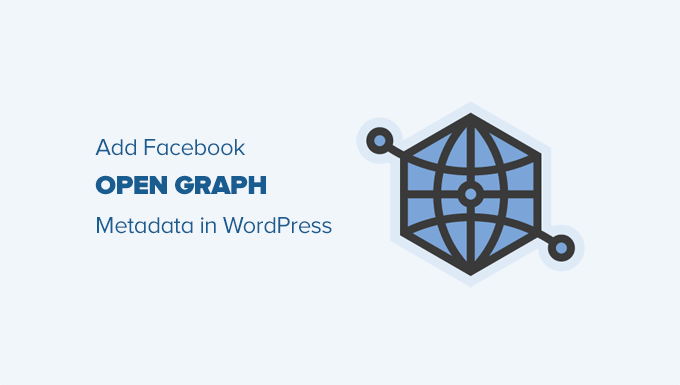
Vous pouvez utiliser les liens rapides ci-dessous pour accéder directement à la méthode qui vous intéresse le plus :
- Ajout de métadonnées Open Graph de Facebook avec AIOSEO
- Définir les métadonnées Open Graph de Facebook à l'aide de Yoast SEO
- Ajout de métadonnées Open Graph Facebook à l'aide de code
- Foire aux questions sur Open Graph Facebook
- Ressources supplémentaires sur Facebook et WordPress
Important : Veuillez choisir une seule des méthodes ci-dessous. L'utilisation de plusieurs plugins SEO ou l'ajout de code manuellement pendant qu'un plugin est actif peut créer des balises Open Graph conflictuelles, ce qui peut entraîner des résultats de partage inattendus. Nous recommandons la méthode 1 utilisant AIOSEO pour la configuration la plus simple et la plus complète.
Méthode 1 : Ajout de métadonnées Open Graph de Facebook avec AIOSEO
All in One SEO est un plugin SEO WordPress populaire utilisé par plus de 3 millions de sites Web. Il vous permet d'optimiser facilement votre site Web pour les moteurs de recherche ainsi que pour les plateformes sociales comme Facebook et Twitter.
Tout d'abord, vous devez installer et activer le plugin gratuit All in One SEO. Pour plus de détails, consultez notre guide étape par étape sur comment installer un plugin WordPress.
Après l'activation, vous devez visiter la page All in One SEO » Réseaux sociaux. Ici, vous pouvez entrer l'URL de votre page Facebook et tous vos autres réseaux sociaux.
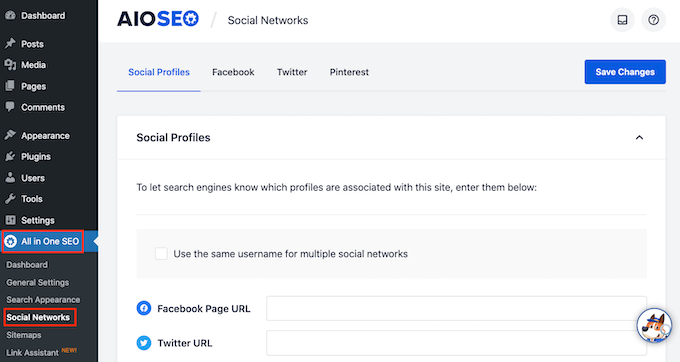
Ensuite, cliquez sur l'onglet Facebook en haut de la page, et vous verrez que le balisage Open Graph est activé par défaut.
Vous pouvez cliquer sur le bouton « Télécharger ou sélectionner une image » pour choisir une image OG Facebook par défaut si un article n'a pas d'image Open Graph.
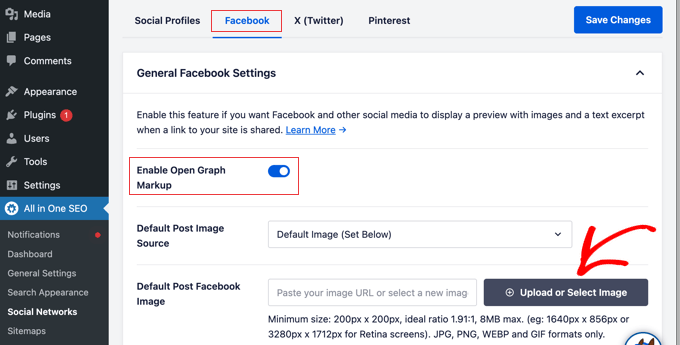
Si vous faites défiler vers le bas, vous pouvez personnaliser le nom de votre site, la description et d'autres paramètres. N'oubliez pas de cliquer sur le bouton bleu « Enregistrer les modifications » une fois que vous avez terminé.
Maintenant que vous avez défini les métabalises Open Graph pour l'ensemble du site, l'étape suivante consiste à ajouter des métadonnées Open Graph pour les articles et les pages individuels.
Par défaut, AIOSEO utilise le titre SEO et la méta-description de votre article pour le titre et la description Open Graph. Vous pouvez également définir manuellement la miniature Facebook pour chaque page et article.
Modifiez simplement l'article ou la page et faites défiler vers le bas jusqu'à la section « Paramètres AIOSEO » sous l'éditeur. De là, passez à l'onglet Social, et vous verrez un aperçu de votre miniature.
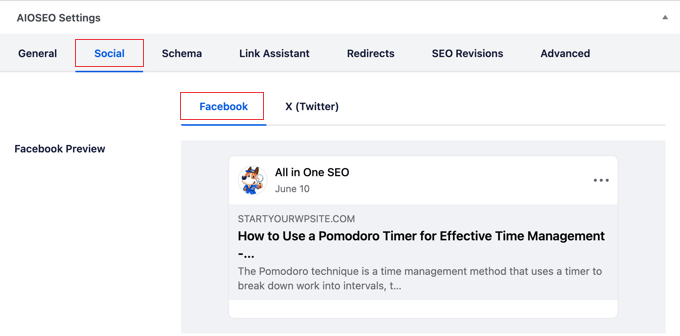
Vous pouvez définir l'image des médias sociaux ici, ainsi que le titre et la description.
Faites simplement défiler vers le bas jusqu'au champ « Source de l'image ». Vous pouvez choisir d'utiliser l'image mise en avant, de télécharger une image personnalisée ou d'autres options.
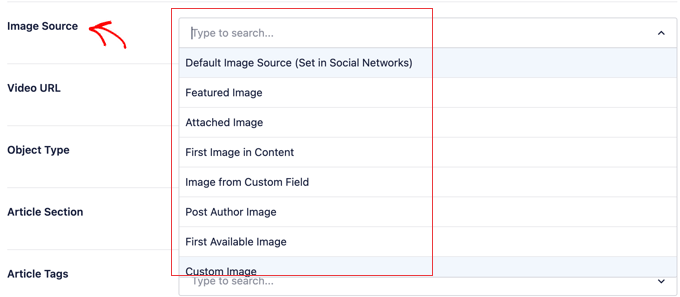
Méthode 2 : Définir les métadonnées Open Graph Facebook à l'aide de Yoast SEO
Yoast SEO est un autre plugin SEO WordPress que vous pouvez utiliser pour ajouter des métadonnées Facebook Open Graph à n'importe quel site WordPress.
La première chose à faire est d'installer et d'activer le plugin Yoast SEO. Pour plus de détails, consultez notre guide étape par étape sur comment installer un plugin WordPress.
Une fois activée, la donnée Facebook Open Graph est activée par défaut.
Vous pouvez vérifier cela en allant dans Yoast SEO » Paramètres et en faisant défiler jusqu'à la section Partage sur les réseaux sociaux. Vous pouvez maintenant vous assurer que la fonctionnalité de données Open Graph est activée.
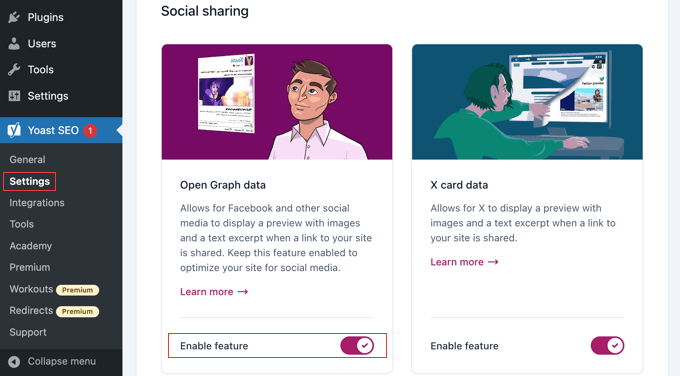
Vous pouvez enregistrer vos paramètres ou continuer et configurer d'autres options sociales Facebook.
Vous pouvez fournir un identifiant d'application Facebook si vous en utilisez un pour votre page et vos statistiques Facebook. Vous pouvez également modifier le titre, la description et l'image de votre page d'accueil Open Graph.
Enfin, vous pouvez définir une image par défaut à utiliser lorsqu'aucune image n'est définie pour un article ou une page.
La version Premium de Yoast SEO vous permet également de définir des métadonnées Open Graph pour des articles et des pages individuels. Modifiez simplement un article ou une page et faites défiler vers le bas jusqu'à la section « Yoast SEO » sous l'éditeur.
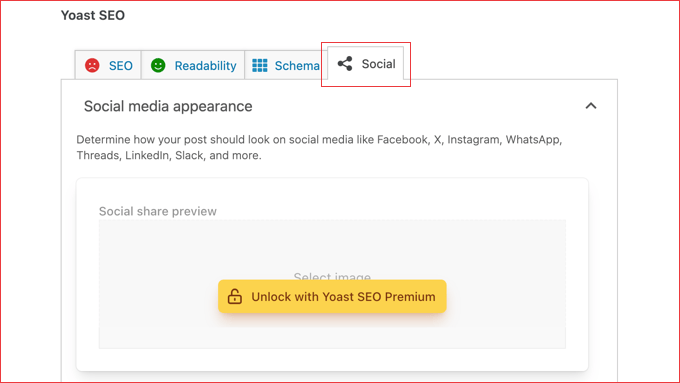
À partir de là, vous pouvez définir une miniature Facebook pour cet article ou cette page particulier(e). Si vous ne définissez pas de titre ou de description d'article, le plugin utilisera votre titre et votre description méta SEO.
Vous pouvez maintenant enregistrer votre article ou votre page, et le plugin stockera vos métadonnées Facebook Open Graph.
Méthode 3 : Ajout de métadonnées Facebook Open Graph via le code
Cette méthode vous oblige généralement à copier et coller du code dans le fichier functions.php de votre thème. Cependant, nous vous recommandons d'ajouter le code à l'aide du plugin WPCode à la place, ce qui rend plus facile et plus sûr l'ajout de code personnalisé dans WordPress.
WPCode est également livré avec une bibliothèque d'extraits de code prêts à l'emploi, y compris un pour l'ajout de balises Open Graph de base, il ne faut donc que quelques clics.
Tout d'abord, installez et activez le plugin gratuit WPCode. Pour plus de détails, veuillez consulter notre guide sur comment installer un plugin WordPress.
Après l'activation, vous pouvez aller dans Extraits de code » + Ajouter un extrait depuis votre tableau de bord WordPress.
Recherchez l'extrait « Ajouter les balises Open Graph de base » dans la bibliothèque. Une fois que vous l'avez trouvé, survolez-le et cliquez sur le bouton « Utiliser l'extrait ».
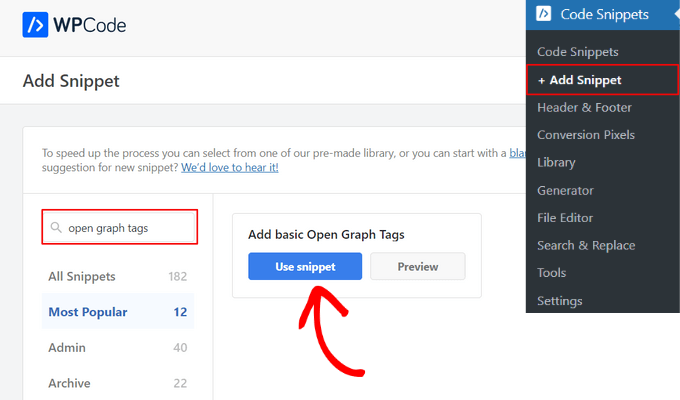
Ensuite, WPCode ajoutera automatiquement le code pour vous, ainsi que définira l'en-tête de tout le site comme emplacement de la méthode d'insertion.
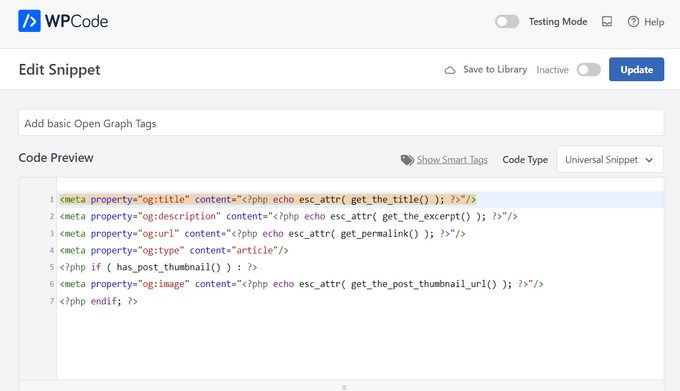
Après cela, tout ce que vous avez à faire est de basculer l'extrait sur « Actif » et de cliquer sur le bouton « Mettre à jour ». Votre thème commencera maintenant à afficher les métadonnées Facebook Open Graph dans l'en-tête WordPress.
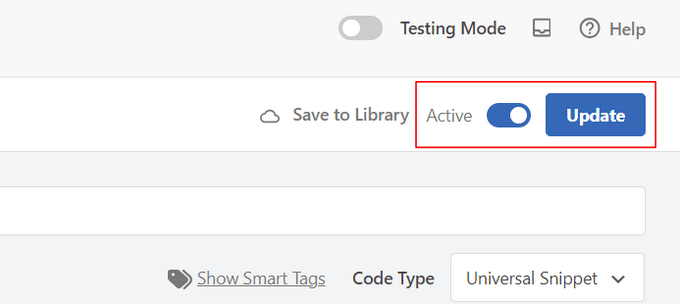
Si vous êtes un utilisateur avancé, vous pouvez toujours copier et coller le code ci-dessous dans le fichier functions.php de votre thème.
Étant donné que cela nécessite de modifier directement les fichiers de votre thème, assurez-vous de sauvegarder les fichiers de votre thème avant d'apporter des modifications.
//Adding the Open Graph in the Language Attributes
function add_opengraph_doctype( $output ) {
return $output . ' xmlns:og="http://opengraphprotocol.org/schema/" xmlns:fb="http://www.facebook.com/2008/fbml"';
}
add_filter('language_attributes', 'add_opengraph_doctype');
//Lets add Open Graph Meta Info
function insert_fb_in_head() {
global $post;
if ( !is_singular()) //if it is not a post or a page
return;
echo '<meta property="fb:app_id" content="Your Facebook App ID" />';
echo '<meta property="og:title" content="' . get_the_title() . '"/>';
echo '<meta property="og:type" content="article"/>';
echo '<meta property="og:url" content="' . get_permalink() . '"/>';
echo '<meta property="og:site_name" content="Your Site Name Goes Here"/>';
if(!has_post_thumbnail( $post->ID )) { //the post does not have featured image, use a default image
$default_image="http://example.com/image.jpg"; //replace this with a default image on your server or an image in your media library
echo '<meta property="og:image" content="' . $default_image . '"/>';
}
else{
$thumbnail_src = wp_get_attachment_image_src( get_post_thumbnail_id( $post->ID ), 'medium' );
echo '<meta property="og:image" content="' . esc_attr( $thumbnail_src[0] ) . '"/>';
}
echo "
";
}
add_action( 'wp_head', 'insert_fb_in_head', 5 );
N'oubliez pas d'ajouter le nom de votre site à la ligne 17, où il est indiqué « Your Site Name Goes Here ». Après cela, vous devriez remplacer l'URL de l'image par défaut à la ligne 19 par l'une de vos propres URL d'image.
Nous vous recommandons d'y mettre une image avec votre logo, de sorte que si votre article n'a pas de miniature, il utilise le logo de votre site.
Vous devez également ajouter votre propre identifiant d'application Facebook à la ligne 13. Si vous n'avez pas d'application Facebook, vous pouvez supprimer la ligne 13 du code.
Foire aux questions sur Open Graph Facebook
Nous avons aidé des milliers d'utilisateurs à configurer leurs paramètres de partage social, et quelques questions reviennent très souvent. Voici les réponses aux questions les plus courantes sur l'ajout de métadonnées Open Graph Facebook.
1. Comment puis-je tester si mes balises Open Graph fonctionnent correctement ?
La meilleure façon de vérifier vos balises est d'utiliser l'outil officiel de Facebook, le Débogueur de partage. Entrez simplement l'URL de votre publication ou de votre page, et l'outil vous montrera un aperçu de son apparence lorsqu'elle sera partagée, ainsi que les erreurs ou avertissements qu'il trouve.
2. Quelle est la meilleure taille d'image pour une image Open Graph Facebook ?
Pour de meilleurs résultats sur les écrans haute résolution, Facebook recommande d'utiliser des images d'au moins 1200 x 630 pixels. Il est important de conserver un rapport d'aspect de 1,91:1 pour éviter que votre image ne soit rognée de manière disgracieuse.
3. Pourquoi Facebook affiche-t-il la mauvaise image même après que j'en ai défini une ?
Il s'agit généralement d'un problème de mise en cache. Facebook enregistre les données Open Graph qu'il voit pour la première fois pour une URL. Si vous mettez à jour l'image, vous devez indiquer à Facebook de vérifier à nouveau en passant l'URL par l'outil Débogueur de partage et en cliquant sur le bouton « Gratter à nouveau ».
4. Les balises Open Graph affectent-elles le référencement de mon site web ?
Bien que les balises Open Graph n'affectent pas directement votre classement dans les moteurs de recherche, elles ont un fort effet indirect. Un partage social attrayant et professionnel entraîne des taux de clics plus élevés et plus de trafic, ce qui sont des signaux positifs pour les moteurs de recherche.
Ressources supplémentaires sur Facebook et WordPress
Nous espérons que cet article vous a aidé à ajouter les métadonnées Facebook Open Graph dans WordPress. Vous voudrez peut-être aussi consulter d'autres guides sur la façon d'utiliser Facebook dans WordPress :
- Meilleurs conseils et tutoriels Facebook pour les utilisateurs de WordPress
- Comment publier automatiquement sur Facebook depuis WordPress
- Comment installer et configurer les commentaires Facebook dans WordPress
- Comment créer un flux Facebook personnalisé dans WordPress
- Comment afficher les avis de votre page Facebook dans WordPress
- Comment corriger le problème de miniature incorrecte de Facebook dans WordPress
- Comment afficher Twitter et Facebook de l'auteur sur la page de profil
- Comment créer une page de destination pour les publicités Facebook dans WordPress
- Comment corriger le problème d'oEmbed de Facebook et Instagram dans WordPress
Si cet article vous a plu, abonnez-vous à notre chaîne YouTube pour des tutoriels vidéo WordPress. Vous pouvez également nous retrouver sur Twitter et Facebook.





L'équipe de WPBeginner
Avez-vous défini une image mise en avant ? Avez-vous remplacé l'URL de l'image par défaut dans le code par votre propre URL d'image ?
Ikix
Bonjour, j'ai tout essayé et je n'arrive pas à afficher l'image miniature lorsque je publie l'URL de mon blog sur Facebook. J'ai déjà ajouté le code comme vous l'avez dit, j'ai téléchargé des tonnes de plugins et il n'y a pas d'image sur Facebook ! Pouvez-vous m'aider s'il vous plaît ? S'il vous plaît !
Jason C.
Qu'en est-il d'ajouter une seule image aux options de miniature sur Facebook ? J'ai remarqué qu'il prend mon image mise en avant sans problème, mais qu'il ne prend pas les autres dans la publication. Y a-t-il un moyen de les ajouter manuellement avec un code rapide ?
L'équipe de WPBeginner
Désolé, le plugin n'est plus disponible. Nous avons mis à jour l'article avec de nouvelles informations. Nous espérons que cela vous aidera à ajouter des métadonnées Open Graph Facebook à votre site WordPress.
adepush
Bonjour, votre plugin est-il toujours disponible sur WordPress.org ?
http://wordpress.org/plugins/facebook-open-graph-meta-in-wordpress/
a.
M
il récupère toujours l'image de la barre latérale au lieu de l'image que j'ai mise dans le fichier functions ?
damian
Qu'en est-il de og:description ?
Musadiq
Bonjour,
Comment puis-je inclure un Facebook dans le code ci-dessus ? Afin qu'il puisse publier directement un article sur la chronologie de notre profil et aussi sur notre page Facebook. Merci
Hassan
ça ne marche pas pour moi quand je partage mes posts sur Facebook, ça montre seulement mes dernières photos Instagram
Loes Liemburg
Bonjour, j'ai installé ce plugin, mais je ne vois pas les options OG dans mon menu de paramètres. J'ai actualisé et attendu, mais toujours rien. Qu'est-ce qui s'est mal passé ?
Manuel Gomez
Cette ligne signifie que l'image utilisera la taille moyenne ?
$thumbnail_src = wp_get_attachment_image_src( get_post_thumbnail_id( $post->ID ), ‘medium’ );
Si je remplace par "big", utilisera-t-il la grande image ? Je voudrais voir le lien du post avec le nouveau format sur Facebook, car je peux obtenir plus de clics.
Merci !
Alexandra
Merci ! le code a parfaitement fonctionné !
M
Malheureusement, cela n'a pas fonctionné pour moi, je ne peux même pas le voir apparaître dans le code source de l'en-tête WP. J'utilise la méthode du code car je ne veux pas ajouter de plugins au site.
J'ai vérifié le fichier htaccess et il ne cause aucun problème car il est vide à l'exception de la déclaration des permaliens.
Ce n'est pas non plus un plugin de cache car je n'en ai pas en place. Des idées ?
M
En fait, désolé, cela a fonctionné, mais malheureusement en utilisant l'outil de débogage, il semble toujours que la publication d'un lien sur ma chronologie n'affiche toujours pas l'og:image.
Même s'il est là dans le json. C'est vraiment bizarre. Le débogueur montre la publication mais sans aucune image dans l'aperçu du partage. Des idées quelqu'un ?
Attila
Bonjour Syed,
J'ai utilisé de nombreux plugins pour extraire mes informations méta de graphe depuis que j'ai commencé à utiliser Wordpress et Facebook, et je peux dire que "Facebook Open Graph Meta for WordPress" est le plugin le plus simple et le plus professionnel jusqu'à présent.
J'ai cependant un problème mineur... lors du débogage du lien de mes publications avec le débogueur Facebook, mes informations brutes du document Open Graph ne s'affichent pas correctement. J'ai des caractères spéciaux inclus car mon contenu est en langue hongroise.
Voici un exemple :
Balise Meta :
J'apprécierais si quelqu'un pouvait me dire comment résoudre ce problème.
Merci d'avance et continuez votre bon travail.
Cordialement
JessDelAngel
Salut !
Avez-vous trouvé une solution à cela ?
Cordialement
Jim
Fonctionne bien – merci. C'est toujours la meilleure façon de s'intégrer sans plugin, n'est-ce pas ?
Personnel éditorial
Nous utilisons le plugin WordPress SEO by Yoast pour cela.
Admin
ally
J'utilise ce code depuis longtemps mais récemment il y a eu des problèmes, il ne récupère pas toujours l'image. J'ai utilisé le linter et j'ai trouvé cette erreur :
Propriété inférée La propriété 'og:description' devrait être fournie explicitement, même si une valeur peut être déduite d'autres balises.
J'ai donc ajouté la balise de description et cela semble avoir résolu le problème d'image, mais maintenant elle n'affiche plus le contenu de l'article.
Des idées pour résoudre ce problème ? J'ai juste besoin d'afficher les premières lignes du contenu.
Merci
Personnel éditorial
Utilisez simplement le plugin SEO de Yoast et il l'a intégré.
Admin
Goob
Le plugin SEO de Yoast ne semble pas avoir de descriptions og: pour une seule page intégrées.
Personnel éditorial
Oui, il l'a intégré. Par défaut, il utilise votre méta-description, mais il vous offre également la possibilité de modifier la description à partir de la boîte méta SEO de Yoast.
Theo
Bonjour,
Je me demandais s'il était possible d'avoir un « og:type » différent pour un article et une page. Tel qu'il est (du moins d'après ce que je comprends), pour tout dans WordPress, cela définit « og:type » sur article.
Et si je veux définir « og:type » d'une page sur, disons, « website » et pour un article sur « article » ?
Any suggestions or help much appreciated
Merci
Personnel éditorial
Vous le pouvez certainement avec des instructions conditionnelles.
Admin
Personnel éditorial
Vous devez attacher la miniature de l'article en utilisant la fonction d'image mise en avant.
Admin
seitanist
Quelqu'un peut-il expliquer pourquoi
global $post;
est nécessaire et où il se situe dans le code généré ?
wpbeginner
@seitanist Oui, la raison pour laquelle global $post est ajouté est que ce code est ajouté en dehors de la Boucle dans la section de la page. Afin de récupérer les bonnes informations, nous devons appeler global $post, ce qui fait fonctionner toutes ces balises.
seitanist
Cela a très bien fonctionné ! Merci !!!
Personnel éditorial
Vous pouvez essayer de désactiver la fonctionnalité sociale dans le plugin de Yoast et télécharger le plugin Simple Facebook Connect d'Otto. Il suffit de l'activer et la base s'en chargera.
Admin
Cno
Bonjour, tout a fonctionné ! Lorsque je mets le lien de mon article de blog spécifique sur mon mur Facebook, j'ai la bonne miniature, description et nom du site. Mais la publication sur Facebook affiche également automatiquement l'URL complète de mon site (juste sous le titre de l'article). Au lieu de cela, je veux qu'il affiche le permalien de l'article de blog spécifique – pas l'URL de mon site. De cette façon, je peux intégrer les « likes » pour cet article particulier dans WordPress. S'il vous plaît ! Quelqu'un ?
StephanePerez
Bonjour, j'ai essayé d'installer le plugin mais je ne peux pas l'activer à cause d'une erreur fatale : Cannot redeclare add_opengraph_doctype()…/fbogmeta.php on line 24
Que suis-je censé faire ?
Merci !
techhogger
J'ai collé ces codes comme indiqué sur mon blog techhogger.com mais le problème ne semble pas résolu. Je vois mes codes adsense dans la zone de description. Merci de m'aider.
waqaslone
@techhogger même problème avec… faites-moi savoir si vous trouvez une solution.
wpbeginner
@waqaslone@techhogger Pour que la description apparaisse, vous devez utiliser les extraits. Alternativement, vous pouvez utiliser le plugin Otto’s Simple Facebook Connect et simplement activer la Base. Cela s'occupera de tout pour vous.
techhogger
@wpbeginner@waqaslone@techhogger
J'ai tout fait. J'ai même essayé le plugin que vous avez mentionné. Essayez simplement de partager un article de mon blog et vous saurez ce qui se passe exactement. Dans une certaine mesure, j'ai réussi à supprimer les codes qui apparaissaient dans la section description. Mais maintenant, je ne vois plus la description ni les miniatures de l'article lors du partage sur fb. Je vous serais reconnaissant de votre aide.
wpbeginner
@techhogger@waqaslone Nous utilisons la méthode partagée sur cette page sur notre propre site Web. Tout fonctionne. Nous utilisons SFC sur List25 et cela fonctionne parfaitement. Je ne suis pas sûr pourquoi vous rencontrez ces problèmes. SFC a un moyen très intelligent d'analyser votre contenu et d'en extraire la description. Je sais donc avec certitude qu'il extrait la description. Il extrait également toutes les images. Cela signifie très probablement qu'un autre plugin interfère sur votre site. Avez-vous un plugin WP pour ajouter la boîte de likes ou le bouton de likes ? ou tout autre plugin FB ?
techhogger
@wpbeginner@waqaslone J'ai essayé de partager à nouveau après votre dernière réponse. Et la même chose se produit. Je ne vois que le titre de l'article avec la description comme description de mon blog au lieu de la description de l'article et aucune miniature. J'utilise le plugin Digg Digg pour le partage social.
wpbeginner
@techhogger@waqaslone Veuillez activer le plugin Otto’s Simple Facebook Connect. Supprimez le code que vous avez ajouté dans votre functions.php…
techhogger
@wpbeginner@waqaslone Je pense que ça fonctionne maintenant. J'ai téléchargé et configuré le plugin à nouveau. Et maintenant, il semble que ça fonctionne. Pouvez-vous jeter un œil et me faire savoir si tout va bien maintenant.
ChristopherJosephDowney
J'ai l'habitude de placer des balises meta dans le HTML sur Blogger. Passer à Wordpress a été un casse-tête à cet égard, car je n'ai pas de HTML à modifier et je ne suis pas habitué au CSS. Ce plugin est un rêve, mais il ne semble pas fonctionner correctement. Ma question est la suivante : Il semble que j'aie 3 identifiants différents : mon profil Facebook, ma page fan Facebook (celle vers laquelle mon blog pointe) et mon identifiant de débogueur OG qui apparaît sur la page du débogueur développeur ; quel identifiant dois-je utiliser pour le plugin ? Peu importe celui que je mets dans le plugin, lorsque je clique sur « déboguer », la miniature ne se met pas à jour et est toujours l'un des gifs publicitaires. Puis-je avoir plus d'une miniature par défaut comme je le ferais avec des balises méta en HTML ?
RobKara
Quand un utilisateur accède à ma page WordPress « objet », comment puis-je obtenir l'identifiant Facebook de l'utilisateur s'il s'agit d'un utilisateur Facebook qui consulte la page ? Facebook envoie-t-il une requête signée ou un identifiant Facebook via la chaîne de requête ?
wpbeginner
@RobKara Cette question devrait être posée dans le forum Open Graph car elle dépasse le cadre de cet article.
MetalPhil
J'ai donc installé ce truc sur mon site web (AngryMetalGuy.com) et ça ne fonctionne pas. Je n'ai *aucune* idée pourquoi. Je suis au-delà de la frustration et super confus. Si vous pouviez s'il vous plaît, s'il vous plaît, s'il vous plaît, s'il vous plaît, s'il vous plaît m'aider, ce serait génial.
MetalPhil
PS : Je l'ai installé il y a longtemps et ça ne fonctionne toujours pas. Je rencontre ce problème depuis plus d'un mois maintenant. Ça me tue.
lizbizz
J'ai désactivé le plugin Facebook OG Meta sur mon blog et installé le plugin Simple Facebook Connect à la place, et maintenant tout semble fonctionner correctement sur mon site et mes publications !
Instructions et informations de WPbeginners.com (assurez-vous de les suivre exactement) en utilisant cette publication : https://www.wpbeginner.com/plugins/how-to-install-and-setup-simple-facebook-connect-for-wordpress/
lizbizz
Cela a résolu mon problème pour le bouton Partager sur Facebook, mais maintenant, lorsque j'essaie de partager une publication de mon site sur Facebook en utilisant Hootlet de Hootsuite, la zone de texte de description est vide. Elle affiche la miniature et l'URL correctes, mais aucun texte d'aperçu de l'article. Cela fonctionnait avant et fonctionne toujours pour d'autres sites, donc je pense que c'est arrivé lorsque j'ai installé le plugin... aidez-moi ?
SaijoGeorge
@wpbeginner Facepalm … Thanks for the quick replay mate
wpbeginner
@SaijoGeorge Il ne sortira que l'extrait défini de votre publication. Si vous ne spécifiez pas d'extrait, rien ne sera affiché.
SaijoGeorge
Great plugin .. the only issue I seem to be having is that the meta property=”og:description” spits out some random data . Thr url for a sample post is 1800pocketpc.com/watch-out-for-windows-phone-7/22453/ similar issue on another blog bestwp7games.com/crazy-horses-match-maker-a-path-drawing-game.html ( here og:description comes out to be blank ) I am using thesis variations on both of those sites .. was wondering if any of you guys have come across this issue
. Thr url for a sample post is 1800pocketpc.com/watch-out-for-windows-phone-7/22453/ similar issue on another blog bestwp7games.com/crazy-horses-match-maker-a-path-drawing-game.html ( here og:description comes out to be blank ) I am using thesis variations on both of those sites .. was wondering if any of you guys have come across this issue
Il convient également de noter que la balise meta description sur ces pages semble sortir les bonnes données
wpbeginner
@CarlosDeGuzman Il faut un certain temps pour que le linter se mette à jour.
CarlosDeGuzman
Hi wpbeginner! I installed the plugin on my site, ww w.swimbikerun.ph and it’s not working. I’m still getting these errors on the linter. Also no thumbnails are showing when you share a post on fb. Hope you can help
De plus, la description ne s'affiche pas
Avertissement
Propriété requise manquanteog:title est requis
Propriété requise manquanteog:type est requis
Propriété requise manquanteog:url est requis
Propriété requise manquanteog:image est requis
wpbeginner
@ReyCalantaol Cela n'a rien à voir avec le SEO... les données Open Graph sont pour Facebook...
wpbeginner
@arabsciences@Tia Peterson Vous devez ajouter la Meta Description et notre plugin s'en charge pour vous...
wpbeginner
@arabsciences@Tia Peterson Vous devez ajouter la Meta Description et notre plugin s'en charge pour vous...
wpbeginner
@Tia Peterson Oui, vous devriez le réinstaller via le dépôt.
wpbeginner
@Tia Peterson Oui, vous devriez le réinstaller via le dépôt.
Tia Peterson
@arabsciences@wpbeginner Nope.
arabsciences
Salut
Comment extraire la description de AIOSEO dans un plugin SEO ?
ça ne fonctionne pas pour moi
arabsciences
@Tia Peterson@wpbeginner
J'utilise le plugin All in one seo et je n'ai pas pu extraire la description pour l'afficher dans l'outil d'analyse d'URL
arabsciences
@Tia Peterson@wpbeginner
J'ai trouvé une solution qui affiche les 300 premiers caractères de l'article.
changez simplement og:description par :
<meta property=”og:description” content=”<?php echo strip_tags(get_the_excerpt($post->ID)); ?>” />
ClyoBeck
D'accord, je suis retourné aux fichiers du thème d'origine et j'ai téléchargé le fichier functions.php d'origine. Rien à faire. Toujours un écran noir. Je pense à mettre à jour le thème pour voir si cela peut aider. Je me demande si le code que j'ai mis dans le fichier functions.php a, d'une manière ou d'une autre, changé autre chose. Est-ce possible ?
wpbeginner
@ClyoBeck Assurez-vous qu'il n'y a pas d'espaces supplémentaires en bas du fichier functions.php...
ClyoBeck
Salut les gars,
J'aurais dû simplement télécharger le plugin. Au lieu de cela, j'ai copié et collé le code ci-dessus dans mon fichier functions.php et maintenant mon blog a disparu.
Je suis allé sur mon serveur et, après avoir fait des copies du fichier php dans notepad, j'ai téléchargé l'ancien fichier. Toujours pas de succès.
On dirait que je vais devoir engager un programmeur pour régler ça.
Des conseils ?
Livefyre
@wpbeginner Merci. Je ne pense pas avoir reçu la mise à jour, cependant. Dois-je simplement retélécharger le plugin depuis le dépôt de plugins WP et le réinstaller ?
wpbeginner
@Tia Peterson Je viens de télécharger le correctif pour cela et un autre problème. Il devrait être en ligne dans les 15 minutes ou moins (dès que les mises à jour SVN seront effectuées).
wpbeginner
@SteveJoseph@joshuatj Également avec l'outil d'analyse (je ne suis pas sûr du nombre exact) mais si votre article a autant de likes, alors il ne réinitialisera pas la description / le titre et ainsi de suite... Si je me souviens bien, ce nombre n'est pas très élevé...
SteveJoseph
@wpbeginner@joshuatj Merci pour votre réponse wpbeginner. J'ai essayé votre plugin il y a moins de 3 jours, donc j'étais à peu près certain que c'était la dernière version, mais cela ne semble pas avoir fonctionné pour moi. Je vais suivre votre suggestion qu'il se règlera tout seul, mais la solution actuelle n'est pas idéale. Elle extrait la description de la section « intro » de mon blog, ce qui est utile pour parler de moi à mon public, mais ne fait pas grand-chose pour expliquer pourquoi il devrait cliquer sur l'article ou l'élément partagé. Heureusement, elle affiche la bonne image et le bon titre de publication, mais pas la description de la publication elle-même.
Étant donné que Facebook a tant vanté Open Graph, vous auriez imaginé qu'ils s'assureraient que cela fonctionne et que ce soit bien solide. Merci encore.
Tia Peterson
Salut ! Pour une raison quelconque, le plugin ne récupère pas de description. Au début, j'ai compris qu'il récupérait la description du champ « extrait », alors j'ai commencé à utiliser ce champ à chaque fois. Maintenant, il ne récupère même plus à partir de là. Je ne sais pas pourquoi. J'utilise la dernière version du plugin, le thème enfant StudioPress News pour Genesis, et la version de Wordpress 3.1.
Voici notre article le plus récent pour vous montrer que lorsque vous collez cette URL dans Facebook, seules l'image et le titre s'affichent. Dans le code source, le champ de description pour le plugin Open Graph est complètement vide. http://www.bizchickblogs.com/2011/08/what-do-you-know-about-naturopathy.html
Merci pour votre aide !
wpbeginner
@SteveJoseph Facebook met un peu de temps à mettre à jour les anciens articles, mais cela se corrigera tout seul.